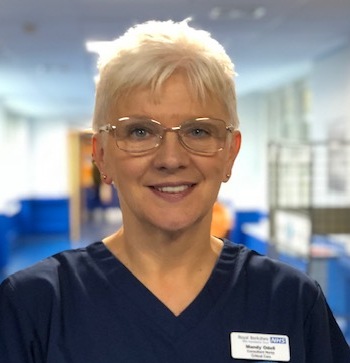Home News & Views Mighty oaks from little acorns grow….
Mighty oaks from little acorns grow….
Dr Mandy Odell, Nurse Consultant, Critical Care, Royal Berkshire Hospital

It all started in Toronto, Canada in 2008. I went to the Rapid Response Systems conference and heard Helen Haskell tell the harrowing story of the preventable death of her 15 year old son. Her story resonated with me, as working in a Critical Care Outreach team, I had experience of patients’ families being concerned about their relative but that concern not being acknowledged or acted upon. There was a ‘Condition ‘H’’ system being run in Pittsburgh, where patients and families could raise concerns directly with the rapid response teams, and I thought I’d like to start something similar in my hospital.
I went back to work, life took over, and the thought of introducing something so novel and challenging was daunting, so I let it drift. That is until I heard Helen speak again the following year, this time in Copenhagen. I came home determined to do something to empower patients and families to call our outreach team if they had concerns about the patient.
I was fortunate to have our ‘Call 4 Concern’© (C4C©) proposal accepted onto the Patients First programme, facilitated by FoNS, who supported our pilot project.
Our outreach team members benefitted from a lot of information and support in project management, and the project itself was a success, largely I’m sure due to it having been properly implemented. We subsequently published the results of our successful pilot in the British Journal of Nursing, and went on to implement the service across the whole trust.
I can’t deny it was hard work. We worked with patients and families and gradually ironed out glitches and issues that got in the way of the efficient application of the service, such as the communication of the service to patients and families and simplifying how they can contact the outreach team. We also worked with ward staff to ensure that the service was publicised and accepted, and reported C4C© referrals back to ward sisters and matrons. Over the years it has become accepted practice in the hospital; staff themselves have used the service for their loved ones admitted to the hospital, and ward nurses can find it helpful to have a third party involved when there are communication issues with patients and families.
We now have 10 years of experience with our patient and relative activated critical care outreach service and have recently had a 7 year review of the C4C© service published in the British Journal of Nursing. As a UK pioneer of C4C©, we have had world-wide interest in how we have implemented and developed the service, with other UK organisations following suite and implementing their own C4C© service. I’ve been fortunate to be invited to speak at a number of national and international conferences on C4C©. We have continued to work with families and patients to produce filmed narratives of their stories to use to spread the word about this vital patient empowering service, which has the potential to prevent deterioration and even avoidable death.
I’m only a few years off retirement now and I can honestly say that C4C© has been my proudest nursing achievement. Just recently, recommendations for patient and relative activated rapid response were made by both the International Society for Rapid Response Systems, and the newly published Guidelines for the Provision of Intensive Care Services. Who would have thought that so much could have been achieved and resulted in such worldwide appeal from that acorn of an idea 10 years ago?
I’d would like to acknowledge and thank the Critical Care Outreach team at the Royal Berkshire hospital, the nurses and doctors on the wards, managers, FoNS and the Burdett Trust for Nursing who funded the Patients First Programme, and especially the patients and their families who have helped make this vital service such a success.
Patients First was FoNS’ partnership programme with the Burdett Trust for Nursing.
Comments are closed.

